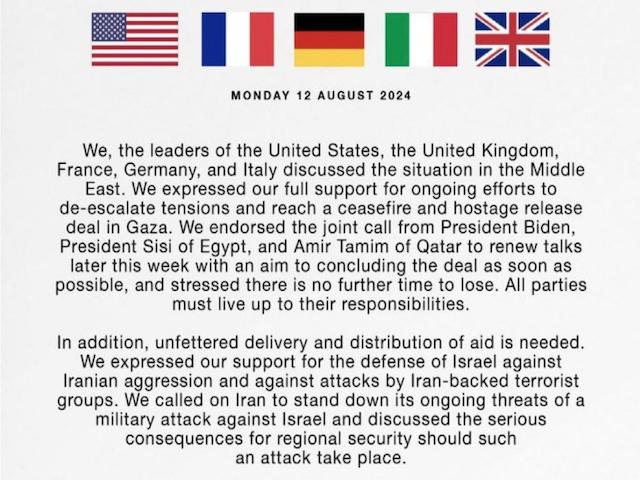Iran's foreign ministry on Tuesday vehemently condemned European leaders for their pleas to refrain from attacking Israel. The terror supporting Islamist regime reaffirmed its unwavering commitment to defend its security, adamantly refusing to seek permission to exercise what it deems its legitimate rights to retaliate against perceived threats despite the fact that it was Iran that gave their proxy Hezbollah to start firing on Israel, and their knowledge and assistance in the planning of the October 7th attacks on Israel.
The statement came on the heels of a stern joint declaration by the United Kingdom, France, and Germany, issued on Monday. The European powers implored Iran and its proxy forces to desist from any aggressive actions against Israel. This appeal followed a surge in hostilities, sparked by Iran's accusations that Israel was behind the assassination of Ismail Haniyeh, the political leader of Hamas, in Tehran two weeks prior. Israel has not commented on the Haniyeh assassination unlike other high-profile operations to neutralize Hamas and Hezbollah leaders where Israel fully briefed the media after the event. Some are speculating that the explosion that killed Haniyeh in his Tehran apartment was orchestrated by Iranian opposition, including possible Revolutionary Guard assistance.
Nasser Kanaani, the outspoken spokesperson for Iran's foreign ministry, lambasted the European statement, labeling it an "excessive demand." He criticized the Europeans for their perceived hypocrisy, accusing them of ignoring the "crimes" allegedly committed by Israel during its protracted conflict in Gaza. Kanaani blasted the European leaders for what he described as their "brazen" request for Iran to hold back from taking "punitive and deterrent actions" against a regime he claims has violated Iran's sovereignty and territorial integrity with the killing of Haniyeh.
A joint statement from the leaders of France, Germany and the United Kingdom on the Middle East. pic.twitter.com/zqXplcegeB
— Keir Starmer (@Keir_Starmer) August 12, 2024
US Issues Grave Warnings Amid Heightened Alert
Adding to the escalating tension, the United States issued a grave warning, suggesting that Tehran or its allied proxy forces might launch an attack on Israel imminently. This stark advisory was echoed in a detailed public assessment by the White House, which indicated that preparations were underway for what could be a significant series of attacks. This assessment aligns with similar concerns expressed by Israeli officials.
John Kirby, the spokesperson for the US National Security Council, expressed shared concerns with Israeli counterparts regarding the timing of a potential Iranian assault, suggesting it could happen within the week. Kirby underscored the difficulty in predicting the exact nature of an Iranian or proxy attack but emphasized the necessity for preparedness.
Simultaneously, Israel's military remained on "peak alert," according to Chief Spokesperson Daniel Hagari. Israeli forces have intensified air patrols over Lebanon, anticipating potential threats from Iran's allies, including the militant group Hezbollah. Despite these heightened military measures, Hagari assured that there were no current changes to civilian guidance.
US Military Reinforcements and Diplomatic Maneuvers
In a show of solidarity and preparedness, the United States is bolstering its military presence in the region. This includes dispatching a guided missile submarine and additional warships and fighter aircraft, reinforcing the existing US military assets pledged to Israel's defense.
Diplomatically, Washington has called on its allies, including Turkey, to exert pressure on Iran to prevent further escalation. US Ambassador to Ankara, Jeff Flake, emphasized the need for allies with ties to Iran to advocate for de-escalation, noting that Turkish officials appeared more optimistic about avoiding an escalation than their American counterparts.
BREAKING:
— Globe Eye News (@GlobeEyeNews) August 12, 2024
United States, France, the United Kingdom, Germany, and Italy issued a joint statement calling on Iran to back down. pic.twitter.com/y2Ks1sgR6b
Global Leaders Urge Ceasefire and Caution
In a concerted effort to defuse the mounting crisis, US President Joe Biden, alongside leaders from the UK, France, Germany, and Italy, issued a stern warning about the consequences of any Iranian retaliation. They called for the resumption of ceasefire talks between Israel and Hamas to end the ten-month war in Gaza.
"We unequivocally support Israel's defense against Iranian aggression and attacks by Iran-backed terrorist groups," the leaders proclaimed in a joint statement. They urged Iran to cease its threats of military action against Israel and highlighted the serious repercussions for regional security should such an attack occur.
As part of these diplomatic efforts, UK Prime Minister Keir Starmer engaged in a rare phone call with Iran's new President Masoud Pezeshkian. Starmer warned of the "serious risk of miscalculation" in any attack on Israel and stressed the importance of calm and careful deliberation. Similar cautionary dialogues were held by German Chancellor Olaf Scholz and Vatican Secretary of State Cardinal Pietro Parolin, both reaching out to President Pezeshkian to advocate for restraint.
The world watches with bated breath as the situation teeters on the brink of further conflict, hoping that diplomatic efforts can steer the region away from the precipice of war.


